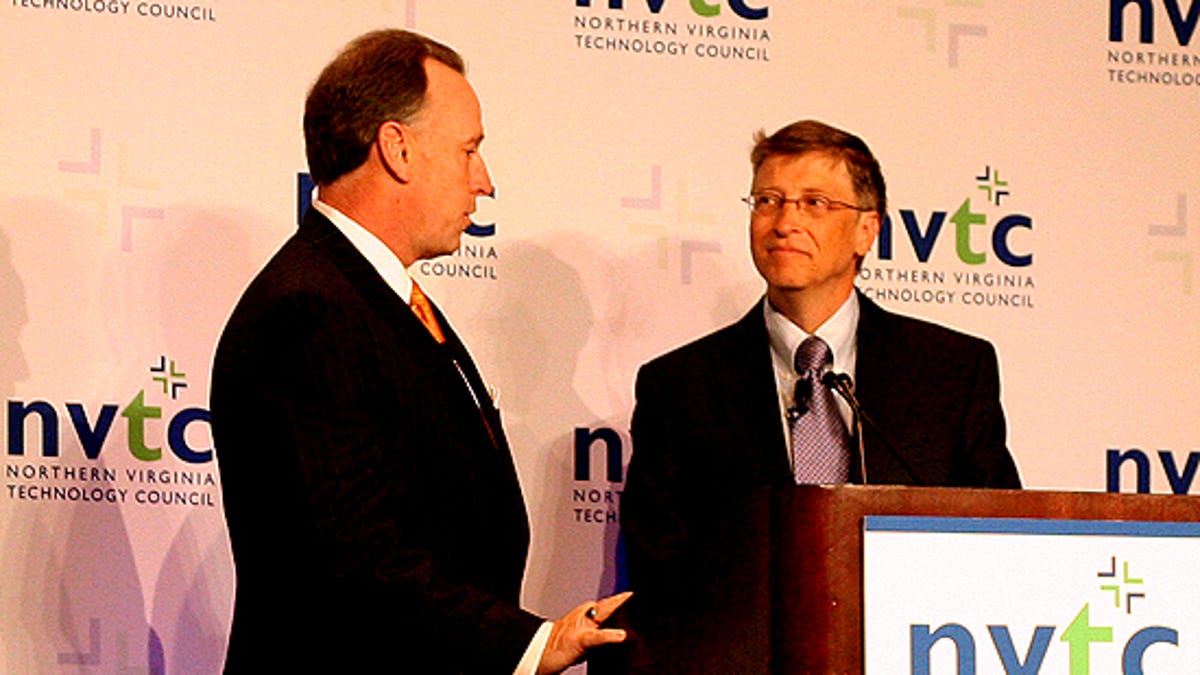Gates, Mundie: Congress must make trade-offs to propel tech's future
Politicians must look beyond poll-friendly actions like income tax rebates and back research investments with longer-term payoffs, Microsoft's chairman and chief strategist say.

Editor's note: This story was updated at 3:40 p.m. PDT to add more on Gates' and Mundies' policy talk.
WASHINGTON--It's not always easy persuading politicians on Capitol Hill to take up items on Silicon Valley's wish list, even if you're Bill Gates and his posse.
That was one message that the Microsoft chairman and Chief Research and Strategy Officer Craig Mundie had on Thursday for the some 1,100 local business and government representatives gathered at a breakfast here sponsored by the Northern Virginia Technology Council. (NVTC's board includes companies like IBM, Micron, Unisys, AOL, Sprint Nextel, and, of course, Microsoft.)
Gates spent most of his hourlong appearance at the event behind a podium in a cavernous hotel ballroom, waxing optimistic about the future of software and hardware. He gave what has become a familiar set of predictions about the increasing digitization of analog things ("smart" white boards in offices, physical desktops that are touch-sensitive computers in themselves, a la Microsoft's Surface tabletop PC) and the rising importance of software in everything from health care to three-dimensional simulations to education.
It was during a question-and-answer session with the audience (in which, for the record, no members of the media were allowed to participate) that Gates and Mundie, seated side by side on the stage, opened up a bit about the dynamics of trying to get their wide-ranging priorities noticed by policy setters.
"Historically, the United States has done a great job of doing the right investments," Gates said. The concern going forward, he said, is whether politicians will be willing to make the "trade-offs" necessary to keep the nation ahead of other countries in the high-tech realm.
For example, it may be more attractive in the short term for politicians to hand out income tax rebates, but they mustn't neglect choices that could support long-term economic growth, such as upping federal grants for research and development and increasing the number of visas for skilled foreign workers, Gates said.
But Mundie, for one, said he sometimes finds that action on Silicon Valley priorities can be a tough sell, as politicians have a tendency to respond, "The polls won't let us do that."
Congress: 'Skewed to the short term'
Members of representative democracy are supposed to know how to balance those competing goals, but Congress's decisions are "too skewed to the short term right now," Mundie said.
Both executives were responding to a question from Rep. Jim Moran (D-Va.), who was present in the event's audience, about the "political context" the Microsoft co-founder and his cohorts have been finding during their in-person meetings with congressional leaders this week.
Gates was on Capitol Hill Wednesday morning speaking to a House of Representatives committee about the need for three major areas of action: increasing the number of H-1B temporary visas and green-card permanent visas that are allotted to high-tech workers; increasing investments in federal research programs; and focusing on ways to improve the educational system, particularly in the math and science fields.
Afterward, he spoke to the Democratic caucus. He also dined with congressional leaders on Tuesday night. All in all, the experience has been what Moran called a "barnstorming tour" of both chambers of Congress.
Gates, echoing his public remarks in Congress Wednesday, said that raising visa caps is the "hot issue of the moment" for his company. Microsoft and others argue that there aren't enough qualified workers to fill highly technical engineering roles at their companies and that a shortage of work visas could stymie their ability to compete with foreign companies. The request, however, is controversial--groups representing American computer programmers argue that a larger number of visas will depress wages and displace American workers.
"I'm still optimistic about the U.S. doing the right thing," Gates said.
White spaces for wireless broadband
In response to an audience member's question, Gates and Mundie also touched briefly on another policy issue that's dear to Microsoft's business: freeing up vacant TV channels--known as "white spaces" in FCC speak--for use as a wireless broadband pipe. Companies like his hope that delivery method could eventually compete with cable and DSL offerings and lead to lower prices and more choices for consumers.
The white spaces are considered ideal for deploying wireless broadband services because its signals can travel long distances and through obstacles--or, as Mundie put it, "the last hope to get some good spectrum." (Microsoft isn't the only company with that view--Google, Dell, Intel, and HP are also interested.)
The plan, however, faces serious resistance from TV broadcasters, who argue that allowing unlicensed devices to roam on that spectrum will cause serious interference to their signals. So far, the FCC
Gates, for his part, said he's "hopeful" that regulators will decide in the tech industry's favor.